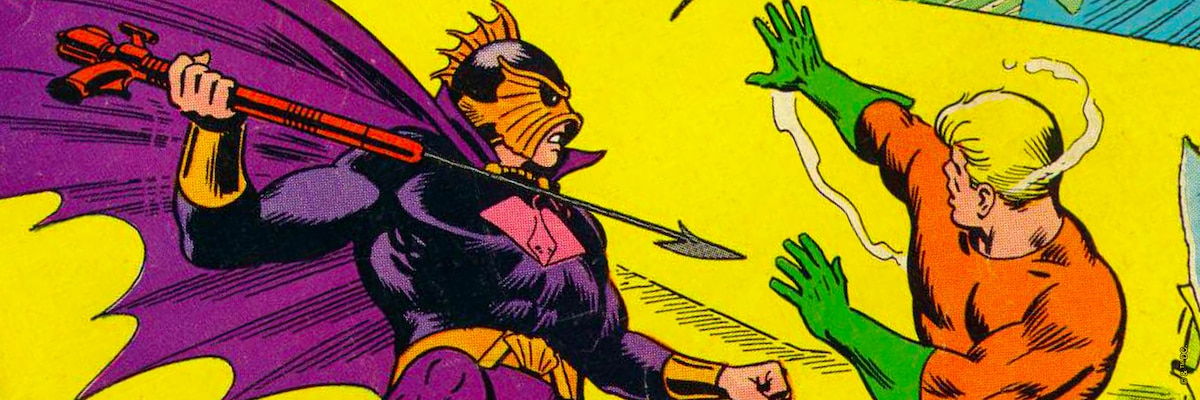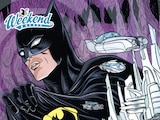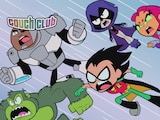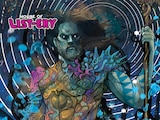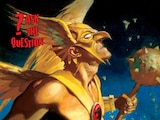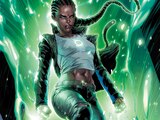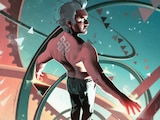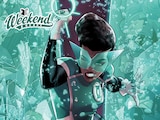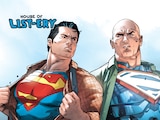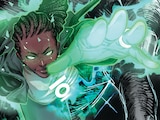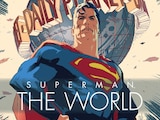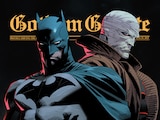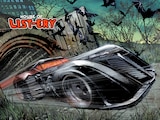Things are about to get wet in the DC Universe, and of course by that I mean Aquaman and the Lost Kingdom is almost here! Yes, on December 22nd, Arthur and his half-brother Orm will be teaming up to take down the nefarious Black Manta. The wild water-filled adventure sets the brothers up as unlikely allies, which means it's the perfect time to look back at their complex comic book history. Were Arthur and Orm ever cohorts in the comics? Have they always been foes rather than bros? Let's dive in.
While Aquaman made a splash with his debut in 1941's More Fun Comics #73, his baby brother and oft-nemesis Orm wouldn't appear until over twenty years later in 1963's Aquaman #29. With the iconic first line, "Now I have you Aquaman! You're doomed like the frightened sardine that you are!" the villain known as Ocean Master burst onto the pages of the adventure series like a hurricane.

Threatening to destroy America in his purple and orange armor, Ocean Master presented a terrifying threat for Aquaman and his sidekick Aqualad, but the truth behind the villain was even scarier than his costume. As Aquaman realized later in the issue during one of their many underwater battles, Ocean Master wasn't just any arch criminal but was instead his own half-brother Orm, who—in this version—had a mortal mother and so never gained Atlantean powers. While Arthur tried to be kind to his younger, bitter brother, Orm vanished after an accident and was never seen again until his appearance here as the Ocean Master.
It was with this dynamic entrance that the decades long feud between Arthur and his brother became a part of DC canon with an impact that is still felt today. Of course, over the years Orm’s origin has changed from mortal man to Atlantean King, but one thing has stayed the same: his antagonism for his half-brother. That relationship has been key to many of Arthur's struggles. It doesn't help that historically Arthur hasn't been a particularly great brother to Orm driving a fierce wedge between the pair.

This simple but fierce rivalry would remain largely the same until Crisis on Infinite Earths changed everything, with most of DC's heroes reemerging differently. Ocean Master was reintroduced post-Crisis as the antagonist in 1986’s new Aquaman #1. Here, Orm and Arthur bicker about their shared human father, Tom Curry. Arthur—or Artie, as Orm calls him—casts himself as a loving brother who simply can't understand the rage of his younger sibling. Orm, for his part, believes that their rivalry has been foretold by an ancient myth of battling brothers rather than any personal issues the pair share. By the end of the miniseries, Orm is seemingly dead, much like this new continuity soon would be.
It was 1994's Aquaman: Time and Tide #3 which reinvented the relationship again. In this Peter David-written miniseries, we discover a young indigenous woman, Kako, has fallen in love with a young Arthur instead of a local man named Orm. The angry Orm attacks Kako, setting off a string of tragic events which essentially force Arthur to leave Kako to protect her. This revised continuity is where a new idea is cemented: now both Arthur and Orm are secret sons of the wizard Atlan rather than the mortal Tom Curry. However, one lone aspect from the 1986 series remains—these brothers are destined to battle for control of Atlantis, forced to reenact a mythical and ancient rivalry.
In the early ’00s, after Arthur was thought to have died, Orm rose from the sea with plans to retake Atlantis that pitted him against the Justice League, making him one of DC's primary villains at the time. Though his brother wasn't actually dead, Orm did have another killer plan up his sleeve that saw him reshape the world so that he was Aquaman and Arthur became Ocean Master. It was a story that once again pitted the brothers against each other and saw the wedge between them grow as Orm used his role as Aquaman to oppress the citizens of Sub Diego while Arthur stuck to his heroic roots to save them and destroy Orm.

As with most continuity, the New 52 reimagined DC's heroes yet again. Arthur and Orm were no exception to this, and their rivalry was reworked once more. This time, Orm was a full-blooded Atlantean and Arthur was back to being Tom Curry's son, but now his mother was Atlanna, an Atlantean royal. The half-brothers were once again at odds and their battle for the throne became even more centered on Atlantis and who would reign over it. Interestingly, though, this iteration is the closest the brothers come to being in alliance after Arthur and Vulko team up to bring Arthur back to Atlantis and take the throne. Arthur instead entrusts it to his brother and the pair make an agreement that he can stay in power as long as he leaves the surface world alone. Of course, things didn't end there as they were soon battling for the throne again—thanks to the machinations of Vulko—and for the most part, that has been their status quo ever since.
Recently, though, during the events of Aquaman/Green Arrow: Deep Target, we got a glimpse of a timeline where Arthur and Orm were close and chose to actually rule alongside each other rather than constantly fight and feud. Though it was short-lived, it established a different vision for the brothers, something that will likely inspire future creators to explore their relationship. With their tentative alliance in Aquaman and the Lost Kingdom, could we be entering a new age of uneasy friendship between two of DC's most conflicted siblings? We’ll find out when Jason Momoa and Patrick Wilson fill the screen later this month!
Aquaman and the Lost Kingdom, featuring Jason Momoa as Aquaman and Patrick Wilson as Orm, lands in theaters December 22nd. For news, trailers and other features on the King of Atlantis, visit our official movie hub page.
Rosie Knight is an award-winning journalist and author who loves Swamp Thing, the DC Cosmic and writing the monthly gossip column here at DC.com. You can also listen to her waxing lyrical about comics, movies and more each week as she co-hosts Crooked Media's pop-culture podcast, X-Ray Vision.
